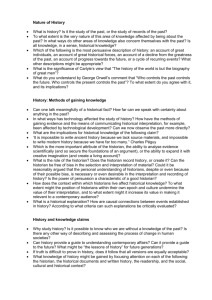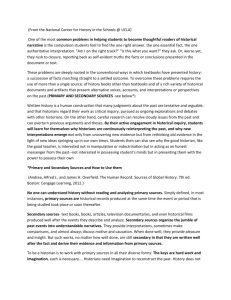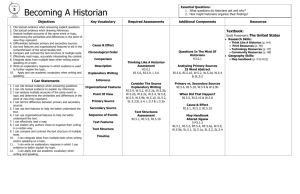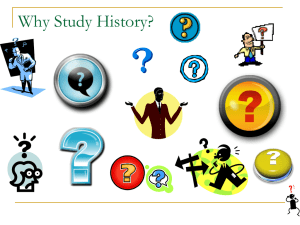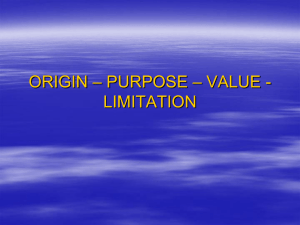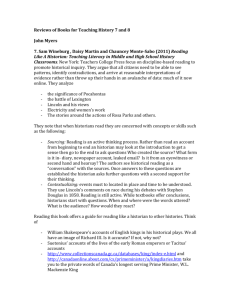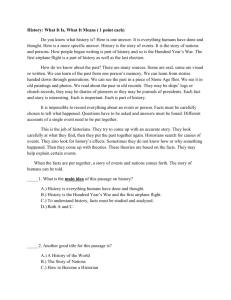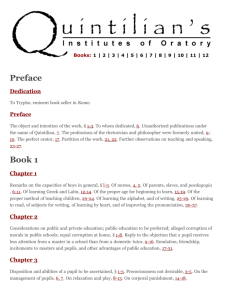Macerata: 9+ November 2011: figure della memoria culturale. Prof
advertisement
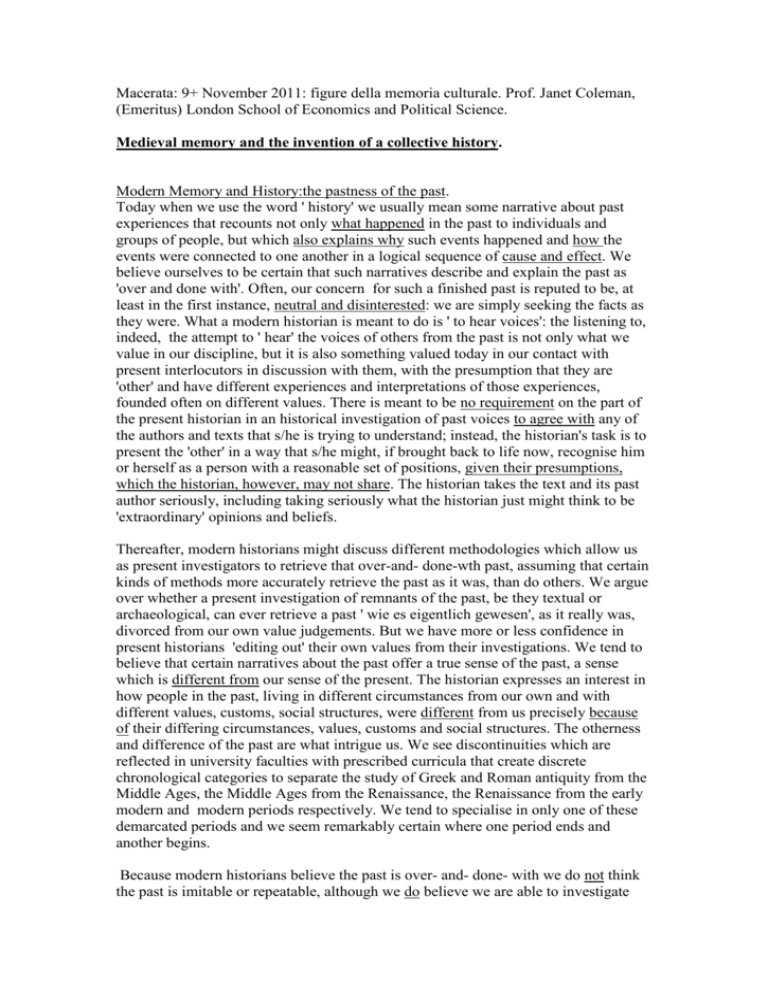
Macerata: 9+ November 2011: figure della memoria culturale. Prof. Janet Coleman, (Emeritus) London School of Economics and Political Science. Medieval memory and the invention of a collective history. Modern Memory and History:the pastness of the past. Today when we use the word ' history' we usually mean some narrative about past experiences that recounts not only what happened in the past to individuals and groups of people, but which also explains why such events happened and how the events were connected to one another in a logical sequence of cause and effect. We believe ourselves to be certain that such narratives describe and explain the past as 'over and done with'. Often, our concern for such a finished past is reputed to be, at least in the first instance, neutral and disinterested: we are simply seeking the facts as they were. What a modern historian is meant to do is ' to hear voices': the listening to, indeed, the attempt to ' hear' the voices of others from the past is not only what we value in our discipline, but it is also something valued today in our contact with present interlocutors in discussion with them, with the presumption that they are 'other' and have different experiences and interpretations of those experiences, founded often on different values. There is meant to be no requirement on the part of the present historian in an historical investigation of past voices to agree with any of the authors and texts that s/he is trying to understand; instead, the historian's task is to present the 'other' in a way that s/he might, if brought back to life now, recognise him or herself as a person with a reasonable set of positions, given their presumptions, which the historian, however, may not share. The historian takes the text and its past author seriously, including taking seriously what the historian just might think to be 'extraordinary' opinions and beliefs. Thereafter, modern historians might discuss different methodologies which allow us as present investigators to retrieve that over-and- done-wth past, assuming that certain kinds of methods more accurately retrieve the past as it was, than do others. We argue over whether a present investigation of remnants of the past, be they textual or archaeological, can ever retrieve a past ' wie es eigentlich gewesen', as it really was, divorced from our own value judgements. But we have more or less confidence in present historians 'editing out' their own values from their investigations. We tend to believe that certain narratives about the past offer a true sense of the past, a sense which is different from our sense of the present. The historian expresses an interest in how people in the past, living in different circumstances from our own and with different values, customs, social structures, were different from us precisely because of their differing circumstances, values, customs and social structures. The otherness and difference of the past are what intrigue us. We see discontinuities which are reflected in university faculties with prescribed curricula that create discrete chronological categories to separate the study of Greek and Roman antiquity from the Middle Ages, the Middle Ages from the Renaissance, the Renaissance from the early modern and modern periods respectively. We tend to specialise in only one of these demarcated periods and we seem remarkably certain where one period ends and another begins. Because modern historians believe the past is over- and- done- with we do not think the past is imitable or repeatable, although we do believe we are able to investigate the over-and-done-with past with some degree of accuracy. We insist, as 'moderns', that we are not like our forefathers but that to some extent we can come to know them in their otherness and express a kind of empathy towards them. This 'modern sense of the past' is a relatively new perspective dating from no earlier than the 18th century- I take as an example Benjamin Constant's influential attempts to distinguish the difference between ancient ( Greek/Athenian) liberty from modern liberty. Currently, there is some very interesting research [ Dr Henning TrueperZurich] on the development of philology as a new technique and discipline that emerged during the 19th century especially in France and Germany and continuing well into the 20th century. Philology was meant to be unique as a 'science' in being able to demonstrate how 'modernity' was to be conceived as very different from the pre-modern. Philological practices were developed which came to have an important effect on how we moderns understand what historical time 'is' and what the past 'was'. The alternatives: EITHER: Thinking differently THROUGH our different languages [ i.e. behind each language is a culture with its distinctive mode of thought; the view that the primary tool by which different peoples think is their distinctive language and how they use it= the modern view] OR: written and spoken languages are merely conventionally- established sign systems that are re-presentations of a prior, necessary, universal, species- specific process of human thinking at all times and in all cultures [ supposedly the pre-modern perspective]. Western European 19th -century oriental and semitic philologies established a cognitive reconfiguration which insisted that humans needed language first in order to think at all and hence, whatever knowing and thinking 'are', they are determined by the different languages people use. As I tried to point out in my Ancient and Medieval Memories: studies in the reconstruction of the past (Cambridge UP, 1992) this 19th century cognitive reconfiguration contrasted with previous theories that had lasted for a much longer time. These older theories insisted that language was simply a representation of prior necessary thought processes and conceptual categories shared by humans everywhere. Language was taken to be a developed system of signs FOR thinking. But the 19th -century philological position took another view on what knowledge and its modes of acquisition amounted to. Philology as a field and method to study the 'oriental', the semitic and the ancient languages discloses its own historically-given modes of producing, ordering, and justifying knowledge and it had an impact on politics and religion of the time. Philology was an epistemic undertaking and revision. What emerged from philological studies was a series of constructions of other peoples' narratives and collective identities, a set of definitions of discrete 'past' cultures and the degrees to which they endured in the present. The 'philological turn' took the next step beyond Constant, in order to define what was distinctive about the modern, setting it off from the pre-modern. If the ancients were now to be taken to be different from the moderns, then by implication, Aristotle's position on universal cognitive categories in De Interpretatione and in his Categories, was to be rejected and replaced by the philological insistence on a plurality of cultural practices as evidenced in different peoples' grammars and texts. Francois Hartog has observed what he calls 'regimes of historicity' whereby ' being historical' came to be ascribed to selected components of the past. Philology then showed how to impose categories, and thereby define which subjects were now to be studied as ' wholes', as ' unified totalities' and therefore, AS historical, constituting these AS knowledge, and OF OTHERS, in ' the past'. Philology then, was a set of epistemic practices. Philological techniques applied to ancient and semitic grammars and texts were taken to be the keys to determining levels of culture, ranking them and harnessing them to an underlying theory of perfectible progress and autonomy of peoples somehow on the road to self-liberation in ' the modern' and 'now' with a future open to their own determination. No longer could the Ciceronian maxim be seen to be useful in modernity: historia magistra vitae was itself a perspective that was 'overand –done-with'. Medieval Memory and History: the presentness of the past. Here, however, I will attempt to examine a rather different attitude to the past that dominated the Middle Ages and the Renaissance in order to clarify what history meant for people living from the 12th century onwards. I am attempting to reveal what memory was thought to be, how it functioned, and what was considered worthy of remembrance and by whom. Before we can discuss the word ' history' (Latin: historia) we must begin with the Greeks. Aristotle in his Poetica 1451b drew the distinction between the historian and the poet. He said that history relates things that have actually happened and deals with particular events in their order of happening. History, therefore, has no dramatic form, no universal message; it is simply a record of successive events in their order of happening and is thus as chaotic as life. It is valid for one time and place only. But the poet or orator deals with general truths, speaking about what a person with a certain character might say or how he might act. The poet deals with what is probable in possible circumstances that share general characteristics. Poetry draws out the probable, universal lessons from a succession of discontinuous events. The poet is, therefore, a maker of fables that imitate likely actions; he is the creator of a people's plausible fictions. He does not tell it as it had been, but rather as it might have been or might be in the future, given the unchallenged presumptions about different character types and their more or less predictable behaviours. Hence, the methods and purposes of the poet or orator are different from that of the historian. This distinction was lost in ancient Rome of the orators. Cicero, in particular, believed it was the orator's role to be the memory of a people and to elicit from the chaos of lived life an immortal and universal message. Telling it ' how it was' became subordinated to drawing out an exemplary message from the past so that the past was rendered imitable and usable by present auditors. The orator was concerned not with the particular nature of past events or peoples but with those repeatable aspects of men's 'memorable' deeds and their distinctive, respective characters which, it was believed, men in any age could understand, regardless of the changed conditions in which they lived. Note what was going on here: the focus is not on events but on discrete character dispositions of men judged in a fixed way as either admirable or vicious, without regard for different cultural evaluations of the admirable or vicious. Because the orator does not present a chaotic record of lived life but rather, provides a more general account of universal lessons to be drawn from the past experiences of men who are judged of worthy character, now, he unites a community of individual experiencers and rememberers by integrating them into the collectively acceptable plausible fictions of what they take to be meaningful about exemplary men in their common past. His job is, effectively, to edit out the uniquess of any remembered, individualised experiences and to forge in its place a general truth in which all men are meant to share. The orator is a user of the historical record for moral purposes, drawing out what are taken to be timeless and universal messages about noble and admirable behaviour from a plausible, rather than a factually accurate, past. He simply assumes his information about the past is correct and goes on to draw lessons. Cicero was frequently concerned to retell Roman history and to use past examples of men's virtue as exempla so that the behaviour of contemporary men might repeat the successes of men in their ancestral past. For him, it was rhetoric which showed history to be the great teacher of life: this is what he meant when he said ' historia magistra vitae' (De oratore II.9,36; II,12,51). It was neither logical argument and demonstration, nor sensual experiences, but rather rhetorical arguments that were plausible to current auditors, providing what looked like imitable examples drawn from a moralised past, which taught men how to behave correctly in the present and at all times. Aristotle's historian who recorded, uninterpreted, the chaotic facts of life was replaced by the poet-orator who spoke in terms of contemporary plausibilities and possibilities, thereby eliciting from narratives of the past not the otherness or uniqueness of a bygone age, but rather a didactic, generalised message. In De inventione (I.34,57) Cicero discusses ratiocinatio, rhetorical ( not logical) deduction and says that there is no point in requiring proof or logical demonstration of a rhetorical premise which contains a plain statement that must be granted as at least probable by everyone. So the orator teaches a present generation how to imitate what is taken to be the essential and unchanging meaning of an ancestral past to which they are told they are heirs. He asserts ( De inventione I: 37, 68-9) that what has been established beyond doubt is ' that no law has ever been passed except for the good of the state' (!). Orators, then, read a pattern into the past to show that a lesson was there to be learnt and for all times. Unlike Aristotle's historian, the orator reconstructs the past in order to persuade and instruct in the present. The past that Cicero moralises is a past enshrined in texts and the orator provides a moralised exegesis of texts, interpreted in a way that seems plausible to present auditors alone, exhorting to virtue, reclaiming from vice, reproving the bad and praising the good ( De oratore II:8). The orator/historian is not a mere narrator but an interpreter (II.12). The good orator does not deal with particular occasions or names but with affairs and events of a general kind so that the truth may be judged.On this view the moral message from age to age is thought to be the same. All that changes over time are the styles of speaking, the modi loquendi. The orator remembers aspects of the past selectively and he also forgets selectively. As Cicero says in De oratore II.34: ' It is now understood that all matters which admit of doubt are to be decided NOT with reference to individuals who are innumerable, NOR to occasions, which are infinitely various, but to general considerations…'. History for him then, as oratory, is not concerned to verify the facts reported in a text under scrutiny, nor is it concerned to establish how different men in the past were from men in the present. The presumption is that they are not different and indeed, that virtue and vice have always meant what they mean now and to present auditors. What we today call 'moral pluralism' is an impossibility. Isidore of Seville in the 7th century recognised the difference between history as the recording, without interpretation, of particular experiences, and history as rhetorical interpretation, drawing out moral and universally applicable generalisations from the unquestioned and unverified past account. Isidore said that ' historia' narrates real events, true events that really happened. He believed the word ' history' came from the Greek ' historein' which he thought meant: 'to see and comprehend' ( Isidore, 1911 edn. I.44,5). History must therefore be a record of events within the sight of the narrator himself. It must be an eyewitness account of experiences. Isidore pointed out that no one in antiquity wrote history unless he took part in and saw the events he recorded: 'It is better to discover by seeing than to collect by hearing from others, since things seen are published without lying'. (I.41,1-2). This kind of eyewitness reporting is a discipline that belongs to 'grammatica' because ' whatever is worthy of being remembered, once experienced, is committed to letters and writing' ( Haec disciplina pertinet ad grammaticam quia quicquid memoria dignum est litteris mandatur). Letters, litterae, are employed for the memory of things because things absent from experience are bound in letters so that they do not fly away into oblivion. ( Usus litterarum repertus propter memoriam rerum. Nam ne oblivione fugiant, litteris alligantur. (I.3,2)). Letters preserve in a fixed form the fleeting experiences that are recorded. Historia, then, is the freezing of events experienced by a witness, in texts, which are now re-presentative of lived life. Note, however, that for Isidore, the testing of the accuracy of a verbal or written representation of experience was never in question. For him, history is simply the literal re-presentation of eyewitness experience. It is not the study of the things that gave rise to such reports. The only way to ' touch' things of the past or present was through words which re-present, by means of verbal or written signs, such non-linguistic events. 'Litterae sunt indices rerum'. History then, was an art, a part of grammar and since grammar itself is the construing of a text whose veracity is unquestioned, it is not concerned with whether what is reported in a text ever actually happened. Grammar cannot deal with the truth or falsity of the things which give rise to their description in texts. It can only deal with the truth or falsity of verbal propositions. Grammar's truth or falsity does not refer to the accuracy or otherwise of a matching of words either to the non-textual evidence or to the personal experiences which gave rise to words that re-present evidence or experiences. In Ancient and Medieval Memories I argued that the writing of history depended on an attitude to the memory as part of the mind's 'faculties'. The writing of history required that they consider how human rememberers determine what is worthy of being remembered. Memory was one of the psychological faculties engaged in processes that lead to knowing and understanding. During the 12th century many men came to be engaged in the writing of history as a professional endeavour. How did their theories of knowing and remembering as cognitive processes affect how they went about their historiographic task? Such medieval historians have frequently been derided for having no interest in the pastness of the past, and it has even more frequently been said that they simply lacked ' a sense of the past'. ( P. Burke 1969). I believe the latter accusation to be absurd. It is akin to arguing that cultures which admire artists who paint iconically in two dimensions somehow demonstrate to us that they have no capacities to see and live in a three-dimensional world! While it is true that 12th-century historians had little interest in verifying earlier, authoritative, written accounts or in establishing how different men were in the past, the reasons for this have nothing to do with their supposed incapacity to recognise the difference between the past and the present. It is rather that they asked different questions about how the past could be used and in affirming that the meaning of the past was in its present usability, its imitability, they sought, just as had Cicero ( and indeed 15th and 16th- century Renaissance historians, indeed, 21st century ideological historians and ahistorical political theorists), a moral message that was exemplary and without any distancing historical depth. I tried to show in the final chapters of Ancient and Medieval Memories how abundantly clear it is that even in modern psychological theories of remembering based on numerous scientific experiments, remembering is not an unproblematic recollection of all things past. It is instead a selective reconstruction of what is thought ' must have happened', and which is determined by present social and cultural factors which help to determined what, in the first place, is considered worthy of remembrance. Where for modern rememberers and recorders of their memories, such social and cultural factors usually remain implicit, unexamined and unknown, for medieval historians they were explicit and examined. Remembering was for them an exercise in reconstructing harmonies between the past, as recorded in texts, and the present, for use in the present. They came to understand precisely the distinction Aristotle had drawn between the eyewitness historian and the orator/poet/'historian' who interpreted the literally reported experiences as set down in the letters or signs of a re-presenting text. The interpretative exercise of oratory, taught to them by Cicero and other Roman models, was set within their overarching exemplary Christian theme of God's providential design for man's salvation. Hence, Gospel texts may be historical, eyewitness testimonies of events in Judaea and Jerusalem at the time of Caesar Augustus, but they were understood as exemplary messages to be capable of being applied to and by Christians in any age. Examining 12th-century texts one finds that writers begin to use the word 'historia' to refer to a written account of what had occurred in their own lifetime and which, for the most part, they had experienced. When they extended their accounts to include events which they had not experienced, they referred to authoritative previous accounts and never questioned whether, for instance, the great historian Bede was correct in his descriptions. But when they copied in their own work what Bede wrote about his own times, they did NOT call this 'historia'. It was perhaps 'historia' for him, but not for them. And when they went on to interpret the recorded happenings of their own or earlier times, they were careful not to call this 'historia' either, but rather, interpretatio, interpretation of the literal sense, of the text. Interpretation was an activity which constructed harmonies and continuities of meaning between the past and present. No one was interested in evaluating the literal events of the past in their own terms, and so preserve discontinuities between how it was then and how it is now. Only those writing annals were interested in stopping at the discrete, literal level of the text's ability merely to denote experience. What mattered beyond this literal report was a text's more universal meaning, and meaning was taken to be a consequence of the rational mind's engagement in the intellectual interpretation of a text's literal signs in order to provide a larger meaning at a moral, universal level so that it could be used by a present reader and made applicable to his present. Medieval writers could discern different ways in which men over time literally expressed themselves and they could, therefore, recognise archaic modes of discourse. They knew there was a history of discourse. But they did not believe that the meaning of men's exemplary behaviour and values altered over time. At the level of meaning, exegesis and interpretation, there could be no recognition of archaic modes of thought. Instead, what there was, was truth or error. Men educated in monasteries, cathedral schools and universities learned to read and construe texts from the past according to the rules of ancient Latin grammar and logic. For them, following their Roman mentors, thoughts and mental propositions follow fixed logical and grammatical rules: they are either true or false. They have no historical depth. Put simply: the ancient and medieval ways of looking at things implied a fixed ontology- a presumption about how it always was for men ' to be' in the world- no matter where or when. Hence, there is a logic of thinking that is capable of being represented in signs by spoken or written language as text. Language, be it in the form of mental propositions first and then, subsequently and derivatively, of written propositions, expresses a truth or falsity about the way it ' is' for all of us.. No one considered the truth to be 'relative'. Instead, a written document from the past was taken to be an artificial memory whose meaning was taken to be as relevant to the present as it was to the past. The 12th-century John of Salisbury no less than the 14th-century Petrarca or the 15thcentury Bruni would gladly have shared a straw pallet with Cicero from the first century BC without the slightest worry that the Roman would have difficulty in understanding what John or Petrarca or Bruni meant, and this despite ' the fact' that Cicero was not and could not have been Christian. Indeed, Petrarca who is often singled out as more modern ' and like us', actually insisted that he would have preferred to live in Augustan Rome, that he preferred the past over the present. But he was not desiring to live in what had been a pre-Christain world and re-live the Roman past as it really had been. His letter to Livy, where he says that he wishes either that he had been born in Livy's age or that Livy had been born in his, is a testimony to Petrarca's longing to be elsewhere than in his own turbulent age, and it uses language that has many affinities with a medieval millenarian longing for a new City of God. The letter to Livy tells us nothing about the past as it was. Rather, it expresses Petrarca's longing to be in what he took to be a happy age filled with the kind of virtuous behaviour he did not see around him, certainly not in papal Avignon. But Petrarca believed that he shared Livy's values; that virtues had not changed, and that his own world was corrupt. His expression of a contemptus mundi, shared with numerous Christian contemporaries, does not mean that his sense of ancient Rome was historically accurate. In fact, he was not accurate about Augustan Rome, despite his use of the phrase 'evidence of the past'. In his liber sine nomine 4 he asked: 'when was there ever such peace, such tranquility and such justice; when was virtue so honoured, the good rewarded and the evil punished…than when the world had only one head and that head was Rome?...'.For an historical record of the political brutality of Augustus' reign Petrarca need only have read Tacitus whose texts were available to him, or indeed, his beloved St Augustine's City of God with its blistering condemnation of the Augustan age. Petrarca displayed the very common perspective shared by medieval and Renaissance historians which was that of the presentness of the past. There was, however, a troubling issue that had long been around and very much considered: Augustine himself provided key texts illustrating the problem where antiquity's pagan non-Christians had to be shown to have been not quite exemplary. By the 14th-century they could perhaps be re-named 'virtuous pagans', not having had the good fortune of experiencing evangelisation that was to come in the future, Christian centuries. Another strategy was to argue that pagans had not spoken the truth because they somehow misused grammar and logic; or, that the arguments in pagan texts had to be either re-interpreted to be of present Christian use- value or simply ignored, dropped from the reading list, or actively misconstrued and labeled 'heretical'. No historian from the 12th through the 16th century investigated the past in a disinterested manner and for its own sake. History as oratory diffuses cultural knowledge as ideology, using the past for present purposes. It is not about fact but about narrative compositional techniques that make what is taken to be an unproblematical past useful for the present. It engages a distinctive sense of the past as present. Hollywood films are contemporary types of this kind of history. So too are nationalist reconstructive histories, as well as histories sponsored by modern press barons with a political agenda. Where medieval historians were fully aware that their task was the explanation and promotion of collective meaning of everyday emotions, judgements, beliefs and actions through interpreted reconstructions of a collective past, modern makers of our collective fables display neither a curiosity nor a self-consciousness that is open to verifiable, disinterested investigations about the cognitive products, the ' memories' they purvey to anyone with a tv or an iphone.


